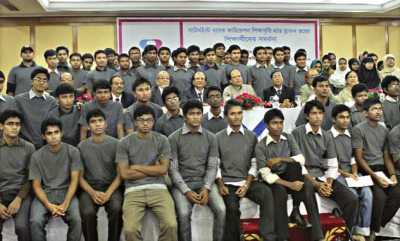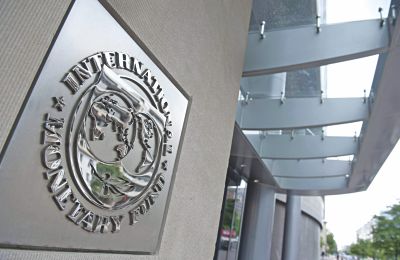Banking
Padma Bridge ProjectMuhith still hopeful of WB funding
Finance Minister AMA Muhith Monday said the government will work out a fresh financing structure for construction of the Padma Bridge, but it did not abandon the hope for World Bank fund for the project.
“Finance ministry will reveal this matter to the media after finalising the new work plan for construction of the Padma Bridge”, finance minister said while speaking to journalists after a meeting with President of the International Fund for Agricultural Development (IFAD) Kanayo F Nwanze at the finance division Monday.
Muhith said after exploring possible fund sources for the bridge project, the ministry would plan a new financing structure.
Referring to the WB country director’s interview published in local English daily Sunday, Muhith said, “This interview makes World Bank’s stance clearer on Padma Bridge issue than its earlier statement.”
The government had earlier signed a contract with the World Bank, Asian Development Bank, Japan International Cooperation Agency and Islamic Development Bank to finance the $2.9 billion project.
The Washington-based global lender, the World Bank, was the major financier with a pledge of providing $1.2 billion to the project. On June 29, it cancelled the contract alleging corruption in the project.
The Daily Sun/Bangladesh/ 17th July 2012
Spend one-third CSR funds for meritorious studentsAtiur urges scheduled banks
 Bangladesh Bank Governor Dr. Atiur Rahman, seen with the students who received scholarships awarded by Southeast Bank, at a function in Dhaka Monday.
Bangladesh Bank Governor Dr. Atiur Rahman, seen with the students who received scholarships awarded by Southeast Bank, at a function in Dhaka Monday.
Bangladesh Bank Governor Dr. Atiur Rahman Monday urged scheduled banks to spend at least one-third of their Corporate Social Responsibility (CSR) funds for helping the poor but meritorious students.
The key to attain sustainable growth of a populous country like Bangladesh lies with the development of human resources and its root is education, he said.
Dr. Atiur was addressing a function to distribute education scholarship and accord reception to 75 scholarship receivers at bachelor level, organised by Southeast Bank at a city hotel.
Referring that the government has identified human resources development as an integral part of overall uplift planning in view to building a technology and knowledge based digital Bangladesh, Governor said today’s learners will emerge as the driving force of knowledge, information and economic growth of the country in course of time.
Emphasising the need for distributing credit among the poorest segment of the population Atiur said the central bank has been working for building a humane banking system, side by side, implementing the government’s poverty eradication and job creation oriented programme.
He said in CSR activities the scheduled banks invested only Tk 550 million in 2009 while the expenditure was raised to Tk 2.33 billion in 2010.
He urged the banks to expand their CSR heads by investing in renewable energy, bio-gas plant, solar power driven irrigation, providing solar lights to the students of char and haor regions etc.
Dr Atiur advised them to add conditions to the credit holders for participating in CSR activities.
Governor said a big portion of the country’s meritorious section of students does not have opportunity to take higher education, and as a result they are dropped out at a stage of their education. Now, time has come to take steps in finding them out and check this in the greater interest of the nation.
Managing Director of Southeast Bank Mahbubul Alam presided over the ceremony while Chairman of the bank and also Chairman of Southeast Bank Foundation, Alamgir kabir FCA, was present as special guest.
Vice Chairman of the Bank, Raghib Ali, Executive Director of Southeast Bank Foundation, M Nurun Nabi, Director Azim Uddin Ahmed, Adviser of the Foundation Zakir Ahmed Khan and Project Director of the Foundation Ayesha Shirin Rahman also spoke on the occasion.
The Daily Sun/Bangladesh/ 17th July 2012
Investment banks' Asian love affair cools rapidly
After the financial crisis, the investment banking mantra became “Shanghai, Mumbai, Dubai or goodbye.” While the rest of the world was falling apart, the countries stretching from Saudi Arabia to India, Southeast Asia and China were growing, and could pick up some slack. Or so the thinking went. But the swingeing decline in the Asian equities business -- the most expensive pillar of Wall Street's expansion -- suggests this was a fallacy. A retreat now looks inevitable.
Stockbrokers have flocked to Asia since 2008. Aside from the big Wall Street firms like Goldman Sachs and JPMorgan and European universal banks like Credit Suisse and UBS, a number of secondary players have bulked up, from US broker Jefferies, the UK's Barclays, Australia's Macquarie, Japan's Nomura, and China's ICBC.
It's easy to see what attracted them. Commissions for trading shares were higher in Asia than elsewhere, mainly due to the scarcity of efficient electronic trading platforms. Competition was still thin, particularly in equity derivatives and prime brokerage. Robust local savings rates and strong growth spurred hope for higher trading volumes and fund raisings alike.
Oops. The value of share trading in the Asia Pacific region fell 22 percent in the first half of 2012, outpacing declines not only in the Americas, but even in the basket case of Europe. Meantime, commissions have been squeezed, falling by as much as 30 percent alone in the past two years in some markets as new entrants have tried to rapidly build market share.
Sales of new shares -- usually a venture between equities and corporate finance departments -- have also taken a hit. Equity proceeds in Asia Pacific (ex-Australia) dropped by 31 percent so far this year to $11.3 billion, according to Thomson Reuters. That's double the rate of decline in the United States. Moreover, an increasing number of banks are scrounging at that shrinking pie. PICC's proposed $3 billion Hong Kong IPO later this year will have a whopping 17 underwriters.
Add it all up, and instead of being a profit engine, the pan-Asian equities business has become a drag. To offer a full complement of cash, derivatives and prime brokerage services across the region -- including share trading, research and compliance -- can cost some $800 million a year, according to one executive. Only one or two firms have revenue of that scale.
The pain is starting to show. Macquarie Group's income from Asia fell 35 percent in the year ended March, compared with a 19 percent gain in Europe and 8 percent decrease in the Americas. Jefferies highlighted the costs of its Asian expansion in its most recent quarterly report, when earnings fell 21 percent from the year before.
The retreat has already started. Samsung Securities shut operations in the region outside Korea a few months ago. Royal Bank of Scotland is selling most of its Asian equities division to Malaysia's CIMB Group. Credit Agricole is in talks to offload its stake in CLSA. Investors focused on troubles in Europe as global banks report their earnings this week may want to ask what plans they have for their Asian operations.
The Daily Star/Bangladesh/ 17th July 2012
Risks to global growth rising: IMF

THE International Monetary Fund stepped up its warnings Monday on risks to the global economy, especially coming from Europe, as it trimmed its growth forecast for the rest of the year.
The IMF said the world economy appeared weaker since its assessment just three months ago, and while growth was only slightly off the expected pace, "downside risks continue to loom large," especially from inadequate or slow policy reactions in major economies.
"In the past three months, the global recovery, which was not strong to start with, has shown signs of further weakness," the fund said in its quarterly revision of economic forecasts.
"Financial market and sovereign stress in the euro-area periphery have ratcheted up," it said, while growth has fallen below expectations in a number of major emerging-market economies.
It pointed to renewed deterioration in the markets for European sovereign debt as a sign that eurozone leaders need to move fast on pledged reforms.
The IMF also singled out the overhanging risk from US political stasis that could send the country over a "fiscal cliff" due to laws that, if not changed, will force massive government spending cuts coupled with automatic tax hikes on January 1 that would severely crunch the world's largest economy.
"Avoiding the fiscal cliff, promptly raising the debt ceiling, and developing a medium-term fiscal plan are of the essence," the global crisis lender said in recommendations for the United States.
After forecasting in April that the global economy would expand by 3.5 percent this year, the IMF said it had cut 0.1 percent off the forecast, but that the number remained at 3.5 percent because of rounding.
For 2013, the forecast is 3.9 percent, down from 4.1 percent.
The change in the worldwide outlook mainly came from sharp cuts to growth forecasts for the large emerging economies like China, India, Brazil and newly industrialized Asia.
But in addition the IMF saw slower-than-expected growth in the United States, Britain and France, among the major industrialized nations. The US forecast dropped 0.1 point to 2.0 percent; France was down 0.1 to 0.3 percent; and Britain was projected to grow at just 0.2 percent, compared with 0.8 percent forecast three months ago.
The bank also said Spain's recession would persist through 2013, after having forecast in April that the country's economy would return to growth next year.
On the bright side, forecasts for this year for Germany and Japan were revised higher -- to 1.0 percent and 2.4 percent, respectively, though the 2013 prediction for each was also trimmed slightly.
Also getting an upgrade was the Middle East and North Africa region, much of which has been struggling through deep political turmoil in the past two years. The IMF said the region would grow about 5.5 percent this year, much better than the 4.2 percent predicted in April.
The IMF said that major economies were making progress on cutting their fiscal deficit burdens, but that doing so remained hampered by more volatility and risk aversion in debt markets, which have sent the borrowing costs of the troubled eurozone periphery countries skyrocketing.
The global lender reiterated its prescriptions of recent months: short-term fiscal balance targets for troubled economies like Spain and Italy can be de-emphasized to allow for growth while more focus is placed on medium-term adjustments and reforms.
"A steady pace of adjustment focused on the measures to be implemented rather than on headline deficit targets is preferable, especially in light of heightened downside risks to the outlook."
Moreover, the IMF suggested, the political stress of too much austerity -- set to meet fiscal targets -- could backfire in countries with IMF or IMF-linked bailout programs, like Ireland, Portugal and Spain.
"The recent deterioration in the political and economic climate in Greece serves as a warning about the potential onset of 'adjustment fatigue,' which remains a threat to continued program implementation."
The Daily Star/Bangladesh/ 17th July 2012
Standard Bank plans to park Tk 100cr in stocks
Standard Bank Ltd has decided to invest an additional Tk 100 crore in the capital market in the next two months, the Bank said in a statement yesterday.
The decision came from the 195th board meeting of the Bank held at its Gulshan office in Dhaka on Sunday.
Kazi Akram Uddin Ahmed, chairman of the Bank, presided over the meeting.
The Daily Star/Bangladesh/ 17th July 2012



